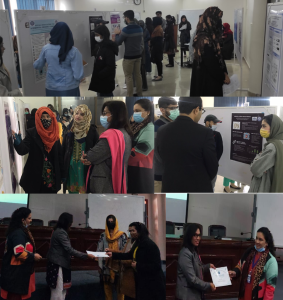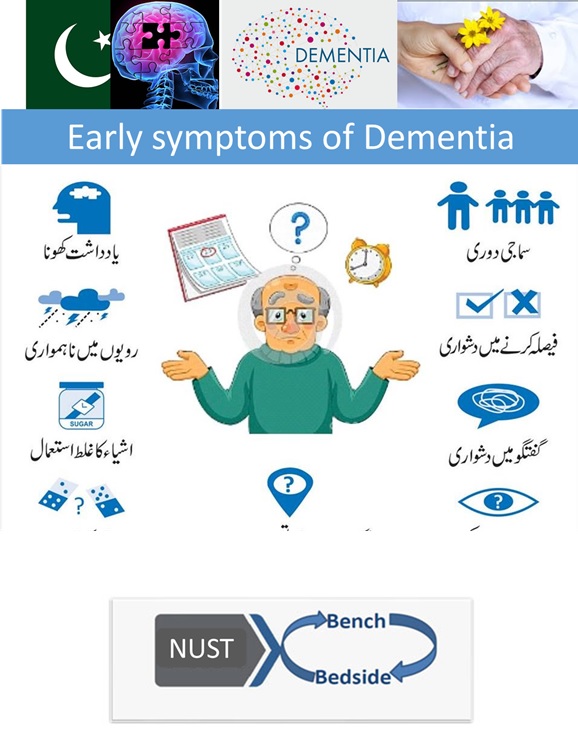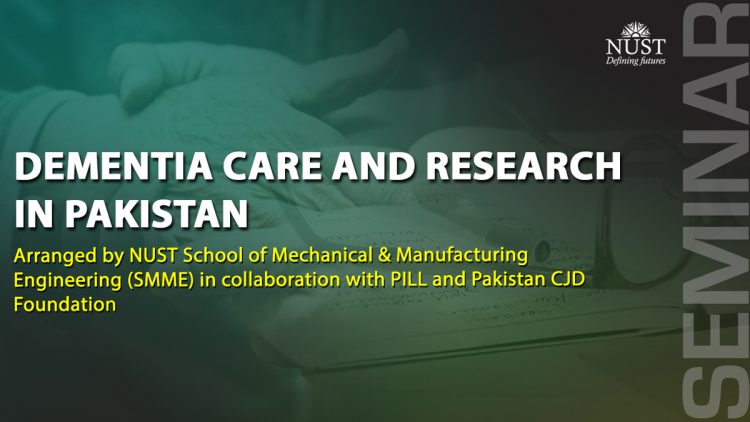World health organization reported, around 50 million people have dementia, with nearly 60% living in low- and middle-income countries worldwide. Every year, there are nearly 10 million new cases. Alzheimer’s disease, Parkinson’s disease and other dementias are age-dependent, so far incurable disorders that are becoming increasingly prevalent as life expectancy grows. Although it is clear that aggregating proteins cause damage to the brain, the mechanisms of aggregate toxicity remain incompletely understood. Current diagnosis of Alzheimer’s disease relies largely on documenting mental decline, at which point, Alzheimer’s has already caused severe brain damage. Researchers hope to discover an easy and accurate way to detect Alzheimer’s before these devastating symptoms begin.
In order to create awareness and promote research in this field, Department of Biomedical Engineering and Sciences (BMES) at NUST School of Mechanical and Manufacturing Engineering (SMME), organized a seminar on Dementia Care and Research in Pakistan in collaboration with the Pakistan Institute of Living and Learning (PILL) and Pakistan CJD Foundation. The event started with poster presentations from graduate students of the BMES department where they described the current state of knowledge about various forms of dementia. The BMES faculty actively participated in the event to encourage their students. The posters were evaluated by Dr. Saadia Zahid (ASAB), Dr. Asim Waris (SMME) and Prof. Dr. Saima Zafar (SMME), NUST and Mr. Roman Nasir won the first prize for his presentation.

In Pakistan, solely, the magnitude of neurological illness is severe with depression. It is estimated that around 2 million people are suffering with Dementia including Alzheimer’s disease. According to a report submitted by the World Health Organization in 2017, 1.27% of total deaths are caused by Alzheimer disease. This death rate is 15.35 per 100,000 and Pakistan ranks #112 in the world.
Considerable progress has been made in demonstrating how biomarkers relate to the pathophysiology of Alzheimer’s; some include expensive and/or invasive putative disease markers obtained by MRI and PET, and those that require collection of cerebrospinal fluid (CSF) via lumbar puncture—a risky and invasive procedure. Still, a formal and definitive Alzheimer’s diagnosis can only be given by autopsy. There is a need for less expensive and intrusive, and widely available, blood-based (serum or plasma) biomarkers that can aid in early diagnosis and predict disease progression. One of the highly distinguishing features of major neurodegenerative diseases leading to dementia is the progressive accumulation of protein aggregates in the brain in a self-propagation-manner with a regional pattern specific to each disease (Tau, Aβ peptides, Prion protein and alpha-synuclein). There is an increasing demand for the understanding of pathophysiology on neurodegeneration diseases at early stages. We are establishing the Ultra-sensitive blood test for the Early detection of Alzheimer’s disease clutches potential for enabling scalable, time-sensitive, and economical-assessment of both early-diagnosis and symptomatic alterations in patients leading towards therapeutic interventions.

Dementia and related neurodegenerative disorders are the mental deterioration caused by the degeneration of brain. It mostly affects part of brain that is associated with memory. Early diagnosis is the key for treating Dementia and related neurodegenerative disorders precisely however for this; an extended research needs to be conducted. Pakistan lacks government-based hospitals or research set ups that primarily focus on Dementia and other neurodegenerative diseases. The number of psychiatrists compared to the patients is also proximate to the pulverised and the lack of training among practitioners and the ancillary paramedical staff. There is an urgent need of extensive research and frequent training and awareness programs to deal with Dementia and related neurodegenerative disorders at grass root level.
Outcome and Features
- Non-invasive early detection assay for the Alzheimer and other dementias.
- Discrimination with other treatable dementias.
- Cost-efficient assay for the Alzheimer’s patients living under compromised socioeconomic conditions in Pakistan.
- Phenotyping of Alzheimer’s disease and becoming a numerically entrenched routine practice, triggering a series of interventional measures at low cost to Pakistani population.
The author is an Associate Professor at School of Mechanical and Manufacturing Engineering (SMME), National University of Sciences and Technology (NUST). She can be reached at saima.zafar@smme.nust.edu.pk.






